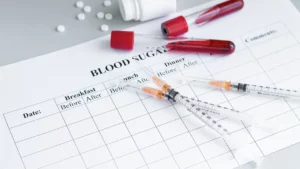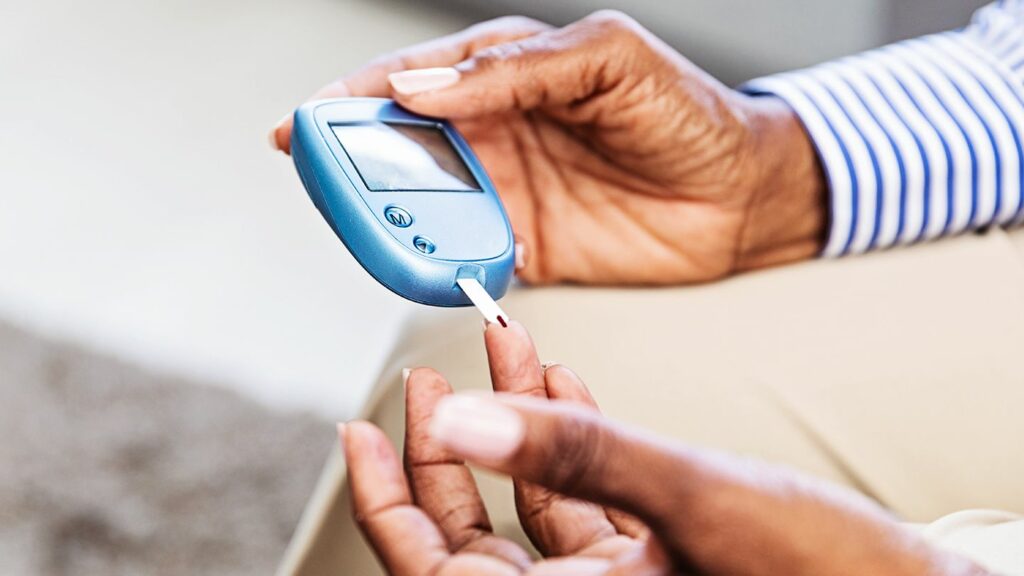Low glucose levels, also known as hypoglycemia, can be a challenging and potentially dangerous condition for individuals with diabetes or other metabolic disorders. Maintaining blood glucose levels within a healthy range is crucial for overall well-being, and when levels drop too low, it can lead to various symptoms and complications. In this comprehensive guide, we will explore the causes, symptoms, and effective treatment for low glucose levels.
Contents
Understanding Low Glucose Levels (Hypoglycemia)

Hypoglycemia occurs when blood glucose levels fall below the normal range, typically below 70 mg/dL. Causes of low glucose levels include excessive insulin or other glucose-lowering medications, delayed or skipped meals, increased physical activity, and alcohol consumption without adequate food intake.
Recognizing the signs of low glucose levels is essential for timely intervention. Common symptoms include:
- Shakiness or trembling
- Sweating
- Irritability or mood changes
- Dizziness or lightheadedness
- Headache
- Confusion
- Blurred vision
- Weakness or fatigue
- Hunger
- Nausea
In severe cases, hypoglycemia can lead to unconsciousness, seizures, and, if left untreated, long-term complications.
Treatment Options for Low Glucose Levels
Effectively managing low glucose levels, or hypoglycemia is crucial for individuals with diabetes or other conditions that can lead to fluctuations in blood sugar. Treatment options vary depending on the severity of the hypoglycemia and the individual’s overall health. Here are some common treatment options for low glucose levels:
1. Fast-Acting Carbohydrates

Fast-acting carbohydrates are a cornerstone in the effective treatment of low glucose levels, providing a rapid source of glucose to elevate blood sugar levels swiftly. When faced with hypoglycemia, individuals can consume easily digestible carbohydrates that are quickly converted into glucose, offering a prompt solution to the immediate energy deficit.
- Common sources of fast-acting carbohydrates include glucose tablets, fruit juice, regular soda, and candy.
- These options are preferred due to their rapid absorption, ensuring a swift increase in blood glucose levels.
- For individuals with diabetes, carrying these portable and easily accessible sources is essential, enabling quick intervention in the event of hypoglycemia.
The effectiveness of fast-acting carbohydrates lies in their ability to raise blood sugar levels within minutes, alleviating symptoms such as shakiness, sweating, and dizziness. Individuals must be aware of the appropriate quantity needed to address their specific blood sugar levels. Healthcare professionals often guide patients in determining the right dosage.
2. Glucagon Injection
In cases of severe hypoglycemia where an individual is unable to consume carbohydrates orally, a glucagon injection becomes a life-saving intervention.
- Glucagon is a hormone that stimulates the release of glucose from the liver into the bloodstream, effectively raising blood sugar levels.
- Administered through injection, glucagon is typically stored in an emergency kit, and individuals with diabetes, as well as their caregivers or family members, should be trained on its proper usage.
- The injection is delivered subcutaneously or intramuscularly, and its effects are relatively rapid, making it a critical measure for situations where oral intake is not feasible.
The glucagon injection is particularly important when an individual with diabetes loses consciousness or experiences seizures due to hypoglycemia. It acts as an emergency response, buying crucial time until further medical assistance can be sought.
3. Snacking
Snacking serves as a proactive approach to preventing and treating low glucose levels.
- Consuming a balanced snack that includes a combination of carbohydrates, protein, and healthy fats helps sustain blood sugar levels. This provides a more gradual and prolonged release of glucose into the bloodstream.
- Examples of balanced snacks include a small piece of fruit with nut butter, yogurt with berries, or whole-grain crackers with cheese.
- The combination of carbohydrates and protein ensures a sustained energy release. It helps to prevent subsequent drops in blood glucose levels.
This approach is particularly beneficial for individuals who experience hypoglycemia between meals or during extended periods without food intake. It not only addresses the immediate need for glucose but also contributes to overall nutritional balance and long-term glucose stability.
4. Meal Planning

A fundamental and ongoing strategy for managing low glucose levels is thoughtful meal planning. Regular, well-balanced meals play a crucial role in preventing hypoglycemia. This provides a steady supply of nutrients and energy throughout the day.
- Meal planning for individuals with diabetes involves considering the glycemic index of foods, balancing carbohydrates with proteins and fats, and timing meals in coordination with medication, if applicable.
- Small, frequent meals spread throughout the day can help maintain stable blood sugar levels. It also prevents the rapid fluctuations that may lead to hypoglycemia.
Consultation with a registered dietitian or healthcare professional is often recommended to tailor meal plans to individual needs and preferences. By integrating meal planning into daily routines, individuals can establish a solid foundation for managing their glucose levels effectively.
5. Adjusting Medication
For individuals with diabetes, especially those using insulin or other glucose-lowering medications, adjusting medication under the guidance of healthcare professionals is a strategic approach to preventing low glucose levels. Fine-tuning the dosage and timing of medications can significantly impact blood sugar control.
- Regular monitoring of blood glucose levels is essential to understanding how medications influence individual responses.
- Collaborating closely with healthcare providers allows for adjustments in medication regimens based on factors such as lifestyle changes, physical activity levels, and overall health.
Individuals should communicate openly with their healthcare team about any concerns or experiences of hypoglycemia. This partnership enables a personalized and dynamic approach to medication management, minimizing the risk of low glucose levels while optimizing overall glucose control.
6. Continuous Glucose Monitoring (CGM)
Continuous Glucose Monitoring (CGM) technology represents a transformative advancement in diabetes management, offering real-time insights into blood glucose levels. CGM devices provide continuous data, allowing individuals to observe trends, identify patterns, and make informed decisions to prevent low glucose levels.
- These devices involve a small sensor placed under the skin, which continuously measures glucose levels and transmits data to a connected device or smartphone app.
- The real-time feedback empowers individuals to adjust their treatment strategies promptly, whether through dietary modifications, medication adjustments, or lifestyle changes.
CGM is particularly beneficial for those with diabetes who may experience fluctuations in blood sugar levels, providing a proactive means of preventing hypoglycemia. By leveraging technology to gain a deeper understanding of their glucose profile, individuals can take a more active role in managing their condition and minimizing the occurrence of low glucose levels.
List of Foods That Raise Blood Sugar Easily
The glycemic index measures how quickly a carbohydrate-containing food raises blood glucose levels. Here is a list of foods that are known to have a high glycemic index and can raise blood sugar easily:
- White Bread: Highly processed white bread has a high glycemic index.
- White Rice: Unlike brown rice, white rice is stripped of its bran and germ, making it quicker to digest and raising blood sugar faster.
- Sugar-Sweetened Beverages: Sodas, fruit juices, and other sugary drinks can cause a rapid spike in blood sugar.
- Candy and Sweets: Candies, chocolates, and other sugary treats are high in simple sugars.
- Potatoes: Particularly when they are mashed or processed, potatoes have a high glycemic index.
- Certain Breakfast Cereals: Many sugary breakfast cereals can lead to a quick increase in blood sugar levels.
- Pretzels and Rice Cakes: These snacks are often made from refined carbohydrates, leading to a rapid blood sugar rise.
- Instant Oatmeal: Some flavored instant oatmeal packets contain added sugars, contributing to a higher glycemic index.
- Pastries and Baked Goods: Doughnuts, cakes, and pastries are high in refined flour and sugars.
- Dried Fruits: While fruits are generally healthy, dried fruits can be concentrated sources of sugar and have a higher glycemic index.
- Honey and Maple Syrup: These natural sweeteners can raise blood sugar quickly.
Benefits of Low Glucose Levels Treatment

Managing and treating low glucose levels, or hypoglycemia is critical for individuals with diabetes or other conditions. This may lead to fluctuations in blood sugar. The benefits of prompt and effective low glucose levels treatment are numerous and contribute to overall health and well-being. Here are some key advantages:
- Prevention of Complications: Timely treatment helps prevent the progression of hypoglycemia to more severe complications such as seizures, unconsciousness, and long-term neurological issues. Addressing low glucose levels promptly reduces the risk of adverse outcomes.
- Improved Cognitive Function: Hypoglycemia can affect cognitive function, leading to confusion, difficulty concentrating, and irritability. Treating low glucose levels promptly, individuals can avoid these cognitive impairments and maintain optimal mental acuity.
- Enhanced Physical Performance: For individuals engaging in physical activities or exercise, maintaining appropriate blood glucose levels is essential. Effective treatment of low glucose levels ensures that the body has an adequate supply of energy. It improves physical performance and reduces the risk of fatigue or weakness.
- Prevention of Emergency Situations: Severe hypoglycemia can lead to emergencies, including loss of consciousness and seizures. Proper treatment helps avoid these critical situations, ensuring the safety of individuals with diabetes and minimizing the need for emergency medical interventions.
- Quality of Life Improvement: Chronic episodes of hypoglycemia can significantly impact an individual’s quality of life. By effectively managing and treating low glucose levels, individuals can lead a more stable and fulfilling life. It is free from the disruptions caused by frequent blood sugar fluctuations.
- Enhanced Focus on Daily Activities: Hypoglycemia symptoms, such as shakiness, dizziness, and irritability, can interfere with daily activities. Treatment restores blood glucose levels to the normal range, allowing individuals to focus on their work, studies, or daily routines without the hindrance of these disruptive symptoms.
- Prevention of Long-Term Complications: Chronic hypoglycemia can contribute to long-term complications, including neurological damage. Consistent and appropriate treatment helps prevent the development of such complications, preserving overall health and well-being.
- Stabilization of Mood and Emotions: Low glucose levels can significantly impact mood, leading to irritability and mood swings. Treating hypoglycemia stabilizes blood sugar levels, contributing to emotional well-being and reducing the risk of emotional disturbances.
- Optimal Medication Management: For individuals using insulin or other glucose-lowering medications, effective treatment of low glucose levels enables better management of these medications. This may involve adjustments in dosage or timing to prevent future episodes of hypoglycemia.
How To Get Low Glucose Levels Treatment?
It’s important to note that managing and treating low glucose levels typically involves personalized medical advice and guidance. Online resources can provide general information and support, but consulting with healthcare professionals is crucial for individualized care. Here are some reputable websites that offer valuable information on low glucose level treatment, diabetes management, and related topics:
- American Diabetes Association (ADA): The ADA offers comprehensive information on diabetes, including resources on managing low glucose levels, lifestyle tips, and updates on research and treatment options.
- Diabetes Mantra: Diabetes Mantra provides reliable medical information on various health conditions, including diabetes and hypoglycemia. Their website offers articles, guides, and expert advice.
- WebMD: WebMD is a well-known health information platform that covers a wide range of medical topics. It offers articles, videos, and expert opinions on diabetes management and related issues.
- National Institute of Diabetes and Digestive and Kidney Diseases (NIDDK): NIDDK, part of the National Institutes of Health, provides authoritative information on diabetes, including resources on treatment, research, and lifestyle management.
- Diabetes Forecast by the ADA: Diabetes Forecast is the consumer magazine of the American Diabetes Association. It offers practical tips, recipes, and articles on living well with diabetes, including information on managing blood glucose levels.
- JDRF (formerly Juvenile Diabetes Research Foundation): JDRF focuses on type 1 diabetes and provides resources on treatment options, and research updates. They also provide support for individuals and families affected by diabetes.
- Healthline – Diabetes Hub: Healthline’s Diabetes Hub offers a wealth of articles and information on diabetes, insulin management, and lifestyle tips. It includes expert-reviewed content to support individuals with diabetes.
Remember, while online resources can be informative, it is crucial to consult with healthcare professionals for personalized advice and treatment plans. Always discuss any concerns or questions about low glucose levels with your healthcare team. This is to ensure the most appropriate and effective care for your specific situation.
Conclusion
Effectively managing low glucose levels involves a combination of awareness, preparation, and proactive measures. Individuals with diabetes or other metabolic disorders should work closely with their healthcare team. It is to develop a personalized plan for preventing and treating hypoglycemia. Timely intervention and lifestyle adjustments are crucial in ensuring optimal glucose control and overall well-being.
Do you want to get rid of diabetes? Join our online diabetes treatment program and reverse Diabetes naturally through lifestyle changes such as a Personalized Diet plan, Exercise, Yoga, dieticians, and health coaches.

